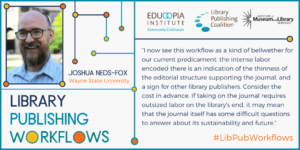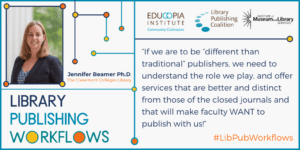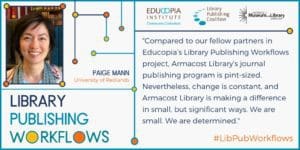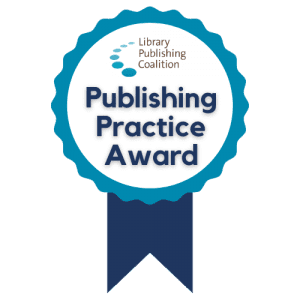November 17, 2021
By Brandon Locke
Editor’s note: This is a guest post in our Library Publishing Workflow Evolution series, featuring reflections from our Library Publishing Workflows partners on how journal publishing workflows at their libraries have evolved over time. You can see the full documentation on the Library Publishing Workflows page.
By Joshua Neds-Fox, writing about his experiences at Wayne State University Libraries
In my earlier blog post for this project, I reflected on the challenges of scaling up and the rewards of participating in a community of practice whose affinities are often more abundant than our differences. My own library publishing program’s contribution to the Library Publishing Workflows project is based on a unique process for our oldest faculty-led journal, the Journal of Modern Applied Statistical Methods (or JMASM, as we often refer to it in shorthand). What a remarkable publication for a new program to cut our teeth on! JMASM is math-heavy, which required mastering new software and learning new character sets and conventions, exploring TeX, MathML, and other forms of equation rendering, and just generally beginning our publishing program with the most complicated project possible. But we did it, because the editor placed his trust in us and we saw multiple opportunities: to support open access research at Wayne State and at the same time learn on the job what it means to be a library publisher.
Overcommitment
In pursuit of those opportunities, we took on the production responsibilities for JMASM, typesetting every issue ourselves. In retrospect, this was an overcommitment, and I wrote earlier about the ways that this limits our ability to scale up. Our commitment was complicated by the fact that JMASM has been very generous in its acceptance rate and publishing schedule: some issues topped 40 articles or more. As we slowly slipped further and further behind schedule, the ambient stress of that commitment weighed heavily on me, and I worked with the editor to implement practices that would make the journal more selective, including strict policies around text-recycling, which is common in JMASM’s discipline.

But behind this stress was the reality that JMASM was essentially a one-man show, editorially. The founding editor continued to shoulder the entire herculean burden of managing and editing the journal, as a labor of love and a commitment to the scholarship of his discipline. In truth, our offer to publish JMASM when he first came to us was a lifeline that both rescued the journal from dying and extended its life a little unnaturally. JMASM’s editor was a remarkable man, one of those principled academics devoted to his field, to his students, to his ethics and to his work. When he passed away in January, it was a shock and a surprise. An intensely private man, he had hidden his illness, its severity, from everyone. In retrospect, there were signs that he anticipated his death, but hindsight is 20/20. We found ourselves with a novel challenge, never having dealt with the death of an editor, which in this case was also the dissolution of the entire editorial team. We’d known for a while that the associate editors for JMASM were consultative at best, and that the founding editor was doing the work. But his death made crystal clear the implications of this common aspect of library publishing: that we do not manage the editorial teams of our journals in quite the same way that commercial publishers do. We had neither process nor mandate to assemble a replacement editorial staff for JMASM.
Moving on from loss
We reached out to a colleague of the founding editor, who served briefly and did yeoman’s work to try to tie up the loose ends. But the number of papers in review—either currently awaiting reviews, or accepted with a request for minor revisions, or returned for major revisions—spoke of the founding editor’s failure to imagine a future where he wasn’t available to continue his work. The backlog was bigger than we understood, and the work ahead of us will entail incredibly difficult decisions. What are our obligations to these scholars who have no recourse to the editorial expertise necessary to advance their papers to publication? What are our obligations to the Journal’s heirs, who now own an ongoing scholarly journal but may not know exactly what to do with it? How are any of these process realities reflected in the workflow we’ve created for the Library Publishing Workflows project? To that last question, I now see this workflow as a kind of bellwether for our current predicament: the intense labor encoded there is an indication of the thinness of the editorial structure supporting the journal, and a sign for other library publishers. Consider the cost in advance. If taking on the journal requires outsized labor on the library’s end, it may mean that the journal itself has some difficult questions to answer about its sustainability and future. And if, like Wayne State, your library publishing program does not manage editorial staff for its journals, consider whether your workflow doesn’t cross the line into fulfilling promises that the editorial staff makes on your behalf. The founding editor is gone, but the promises remain.
On a personal note, I miss JMASM’s editor. He was, as I said, remarkable: an Orthodox Rabbi and lifelong educator who provided a scholarly outlet for statisticians from across Asia, Africa, and North America in a discipline that had no journal prior to his, a mentor and a friend. My hope is that the lessons learned here do honor to his commitment to the pedagogy of assessment: that we would take away from this workflow and this experience the knowledge of how to do better for the next journals that come our way, and that we would put that knowledge into practice.


 On behalf of the LPC Board, we are delighted to announce that the recipient of the 2021 LPC Award for Exemplary Service is Erin Jerome, Open Access & Institutional Repository Librarian, University of Massachusetts, Amherst. The Award recognizes substantial contributions by an LPC community member to advancing the mission, vision, and values of the Library Publishing Coalition.
On behalf of the LPC Board, we are delighted to announce that the recipient of the 2021 LPC Award for Exemplary Service is Erin Jerome, Open Access & Institutional Repository Librarian, University of Massachusetts, Amherst. The Award recognizes substantial contributions by an LPC community member to advancing the mission, vision, and values of the Library Publishing Coalition. 




